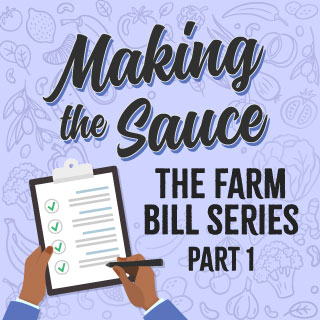The American Public Human Services Association (APHSA) is guided by the unwavering belief in the power of human potential. Human services programs such as the Supplemental Nutrition Assistance Program (SNAP) support individuals and communities by providing the building blocks they need to thrive.
Last spring, when the American Association of SNAP Directors (AASD) Executive Advisory Council (EAC) began the process of creating our recommendations for the 2023 Farm Bill, we named our top three values in a policy as responsive, equitable, and reducing administrative burden. We believe that the recommendations released by APHSA today uplift these values and represent our vision for the future of SNAP.
Our communities rely heavily on the additional resources SNAP benefits provide to families. The cyclical impact of SNAP dollars in our communities has a far-reaching range, from the increased food purchasing abilities for seniors and families who earn a lower income to the utilization of Farmer’s Markets, big box chain markets, and small grocers to the expanded capacities for food banks/pantries.
From the state perspective, we can utilize lessons learned and experiences with clients to move to a modernized SNAP program that meets tomorrow’s demands. To us, modernizing SNAP means improving program access to all. And to do this, we must consider the diversity of the populations we serve, target underserved areas through additional outreach and innovative practices, and eliminate administrative complexities of SNAP for front-line workers and customers. We believe that we can reimagine program requirements to create a more accessible SNAP program while retaining program integrity.
Since the 2018 Farm Bill, state SNAP agencies have been witness to, implementors of, and learners of the countless changes to adapt and modernize SNAP across the country. From the nationwide implementation of SNAP online purchasing to the creation of numerous online and mobile features, the implementation of the new SNAP Employment and Training (SNAP E&T) rule, and the creation of the National Accuracy Clearinghouse, there have been many new technologies and systems introduced to SNAP. There has also been an increased focus on human-centered design and delivery of programs as states, and their partners are challenged to think about the structures and systems that have created the significant gaps in racial equity that we see today.
In response to the COVID-19 pandemic, we’ve seen an unprecedented and exponential increase in SNAP caseloads and the creation of waivers and flexibilities from the USDA Food and Nutrition Service (FNS). The government has shown that when provided with the necessary resources, it can adapt and deliver services to people when they need them.
These past years have shown us that the seemingly impossible can be achieved when local, state, and national partners band together to hear what others need, be flexible in what is permissible, and share a common vision of well-being. But it is never without hard work by those advocating, planning, and implementing the solutions.
As we look toward the 2023 Farm Bill, we see many opportunities to both codify what states have tested and have determined work and to create resources to test further initiatives that may be suitable for permanent adoption in the future. The lessons that have been learned and the doors that have been opened over the past four years must be applied to the future. Our duty as public servants is to continue pushing the envelope and understand how we can streamline service delivery and improve customer experience to help people put nutritious, desirable, and affordable food on people’s tables.
Our recommendations are divided into the following sections:
 |
Improving Customer Experience in Benefits Access to share key priorities for strengthening our ability to serve the people and families that interact with our systems each day. |
 |
Creating Pathways for Economic Mobility through SNAP E&T and Work Supports to outline our 10-point plan to strengthen SNAP E&T to help people connect to meaningful work and support them in continued growth while mitigating benefit cliffs along the way. |
 |
Advancing Equity in SNAP Policy to look back at systems and structures built into SNAP that disproportionately harm people of color and those in critical points in life, such as college students or people re-entering their community. |
 |
Strengthening Program Integrity to ensure that as we continue to innovate and modernize, we are not forgetting the importance of creating a responsible program. |
 |
Improving SNAP Technology and EBT Infrastructure to help strengthen the systems we already use and help prepare for the future of technology and online and mobile access to SNAP. |
 |
Enhancing Nutrition Security through SNAP-Ed to continue to increase the evidence base and impact of nutrition education in supporting people to purchase and prepare foods that nourish them. |
 |
Streamlining Administrative Policies and Procedures to revisit policies that are no longer effective in helping us administer SNAP and waste resources that could be better spent elsewhere. |
The 2023 Farm Bill is our opportunity to improve food security for eligible SNAP families by utilizing recommendations that represent the voice of states bringing forth their expertise in administering the program. We must continue to pursue much-needed changes to ensure that SNAP is available to every eligible family without the complexities experienced today and that states are able to protect the integrity of the program without the interference of unnecessary administrative burdens. If we integrate the voices of states and our customers to make a sound policy change, we can and will make a difference for many years to come.
∎
